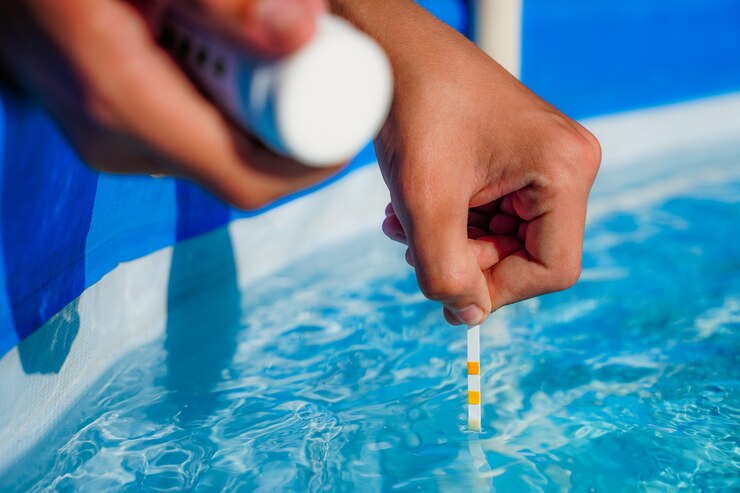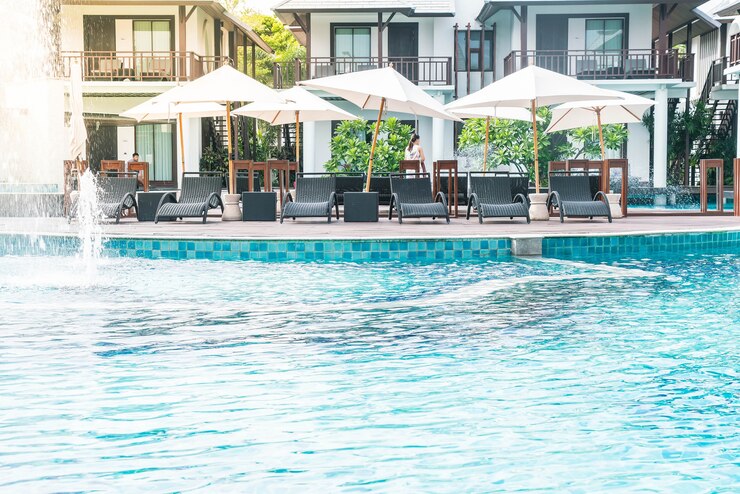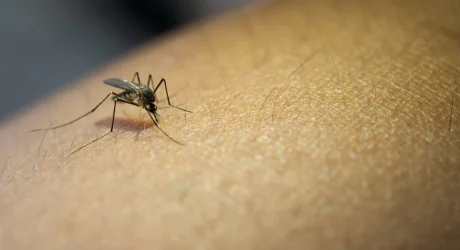That’s something that every swimmer has to ask themselves.
Swimming in the swimming pool is fun, but the chemicals involved in keeping them clean and clear can be dangerous if they’re not used properly.
This article will help you understand which pool chemical(s) is necessary for keeping your pool clean and how to use them safely.
What Types Of Chemicals Are Used In A Swimming Pool?
Water is a carrier of many diseases and fungal infections. This is the reason every swimming pool should have well-maintained and purified water.
For the purification of water, many harsh chemicals are used in the water. Usually, these chemicals mix with the right proportions. In the row form, of course, these chemicals are harmful to your skin and health.
1. Chlorine

Chlorine is a chemical that’s used to sanitize the swimming pool. It’s also in bleach, and it’s a strong oxidizer. That means it can be toxic if you’re exposed to too much of it.
It’s been classified as a known carcinogen by the International Agency for Research on Cancer, and some studies have linked chlorine use with respiratory problems like asthma and bronchitis.
2. Sodium Triphosphate
Sodium triphosphate, or STP, is an ingredient that is often added to saltwater pools. It helps prevent the formation of algae and can also be found in your fertilizer or balanced pool water system.
The Environmental Protection Agency (EPA) states that STP can cause both skin and respiratory irritation. It may even cause more serious health problems if exposure occurs over a long period.
3. Sodium bicarbonate
Sodium bicarbonate is a chemical used to reduce the pH of swimming pools. It can also be used to raise the pH, but this is a rare practice.
Sodium bicarbonate can also be used to reduce the amount of chlorine needed to treat your pool by absorbing any organic materials that might have been introduced into it. This makes it an ideal agent for use in hot tubs, where organic matter tends to accumulate more easily than in swimming pools.
Sodium bicarbonate is commonly found in baking powder or as an ingredient in many other household cleanings products like toothpaste, laundry detergent, and dishwasher tablets.
4. Isopropyl alcohol

Isopropyl alcohol is a solvent that is used to dissolve chemicals and dissolve greases. It’s also used in the making of many products, including cosmetics and perfumes.
Isopropyl alcohol is a flammable liquid, meaning it will catch fire when combined with other substances. If you spill this chemical on your skin or clothes and then light them on fire, they may ignite!
Isopropyl alcohol is considered toxic because of its potential to cause harmful effects if swallowed or touched by humans or animals; however, some people are less susceptible than others to these effects based on their age (younger children) or medical condition (people with liver problems).
Isopropyl alcohol can irritate your eyes and throat when you breathe in fumes from using too much of the product at once–so don’t use too much! You should also avoid touching excess amounts of this chemical for similar reasons: it could irritate your skin if left there long enough.
5. Acetone
Acetone is a solvent material and can dissolve within other substances. Acetone is used to manufacture nylon, nail polish remover, and paint thinner. It’s also a cleaning agent that’s frequently used on cars and boats.
Acetone isn’t the only chemical used in pools; there are over 300 chemicals added to swimming pools every year to balance pH levels and keep them clean.
They include chlorine bleach (sodium hypochlorite), bromine, oxidizers such as hydrogen peroxide or ozone generators, sequestering agents such as EDTA (ethylene-diamine tetraacetic acid) or sodium hexametaphosphate (SHMP), buffering agents like sodium carbonate/sodium bicarbonate (“pH up”/”pH down,” respectively) and soaps like sodium lauryl sulfate (SLS).
6. Benzene
Benzene is a carcinogen that’s used in the manufacture of plastics, resins, and synthetic rubber. It’s also a solvent and has been detected in some swimming pools.
Benzene is found in crude oil, natural gas, and coal tar, as well as being produced by industries such as chemical manufacturing plants, refineries, and pulp mills. As well as being present in crude oil, it can also be formed when other chemicals react with water vapor or oxygen during combustion processes (like those used in burning fossil fuels).
Conclusion
In summary, it’s important to realize that you are ingesting some pretty nasty chemicals when you swim in a swimming pool. However, with proper care and maintenance, swimming in a chlorinated pool is no more dangerous than drinking tap water or eating food that contains preservatives like sodium nitrate.
If you feel strongly about the safety of your swimming environment, then consider adding some natural products like citric acid or baking soda to help balance out the pH levels.
Read Also:




























